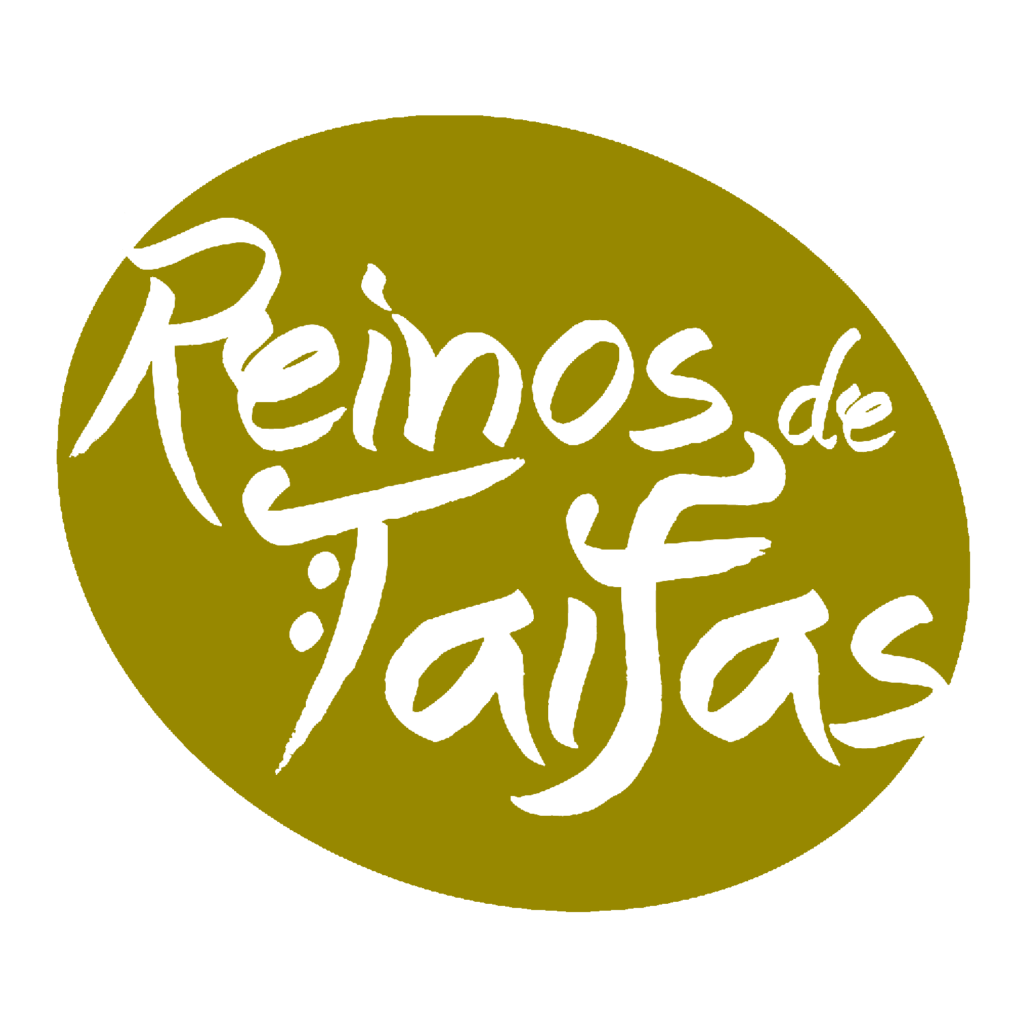Our heritage
From olive tree care to producing extra virgin olive oil, Reinos de Taifas has been a family-run producer since 1700. For over three generations, we have combined tradition and modern innovation to ensure every bottle of our liquid “Green Gold” reflects the care and expertise invested in its creation. We oversee every process step, from managing our olive trees to bottling the oil, making sure the product reaches the customer at its best.
Our location: ideal for growing olive trees
Our olive groves are in Castro del Río, a village in Córdoba, Andalucía, Southern Spain. This region has calcium-rich clay soil, which creates the perfect environment for growing olives. A Mediterranean climate, a combination of hot, dry summers and mild winters, also allows olive trees to flourish, producing fruit with exceptional flavour and nutritional value.
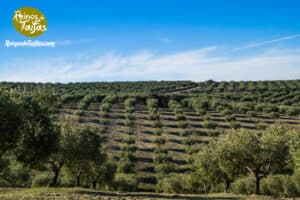
What makes us unique
- At Reinos de Taifas, we prioritise olive tree care because quality is always our top priority. We harvest olives at their peak ripeness, typically between November and February.
- While the oil yield is lower when olives are at their peak ripeness, this ensures maximum nutrient retention and a flavourful olive oil by-product.
- Our meticulous approach includes immediate milling after harvest to retain the olives’ freshness.
Types of olive trees and their characteristics
Our monovarietal Spanish olive oil highlights specific olive tree types’ unique flavours and aromas, where each bottle contains only one olive type. Each olive variety has distinct characteristics that contribute to its flavour and aroma profile:
- Arbequina: Known as a family’s olive oil due to its light, fruity flavour with hints of apple and almond. The oil is smooth and delicate, perfect for salads and baking.
- Picual: Bold and robust, with a peppery finish. It is high in polyphenols and antioxidants, making it ideal for cooking and frying.
- Hojiblanca: Balanced with sweet and spicy notes, suitable for dips and marinades.
- Picudo: Aromatic and nutty, often used in traditional Andalusian cuisine.
- Koroneiki: Originally from Greece, it is an intensely flavoured oil with a fruity aroma.
- Alfafarenca: Intense bitterness, green notes of fresh grass and artichoke, and a peppery finish with a fresh, grassy aroma.
- Pajarera: A mild, fruity flavour with sweetness, balanced bitterness, and notes of ripe fruits like banana and green herbs.
- Cobrançosa: A well-balanced mix of medium bitterness and pungency, with flavours of green apple, tomato, and subtle green tea and almond notes.
These varieties demonstrate how the olive tree type significantly influences olive oil’s characteristics. However, other factors, such as olive tree care, environment, and weather conditions, also affect these characteristics.
Past techniques
Our production methods have evolved over centuries:
- Pre-1890: Animal traction-powered olive milling.
- 1890: Introduction of millstones for more efficient oil extraction.
- 1932: Hydraulic presses and natural decanting methods improved oil clarity.
Modern techniques
In 1975, we adopted cold centrifugation, a chemical-free process, which is the best method that preserves most of our olive oil’s natural properties and nutrients. Our olive oil monovarietal is stored separately in stainless steel equipment to ensure purity and prevent contamination. Therefore, extra virgin olive oil is also known as cold-pressed olive oil.
New cycle (February)
The olive tree care process begins in February with soil fertilisation to replenish essential nutrients. Pruning follows, removing old branches to enhance sunlight exposure and better and healthier nutrient distribution. These practices promote healthier and stronger trees and higher-quality fruit.
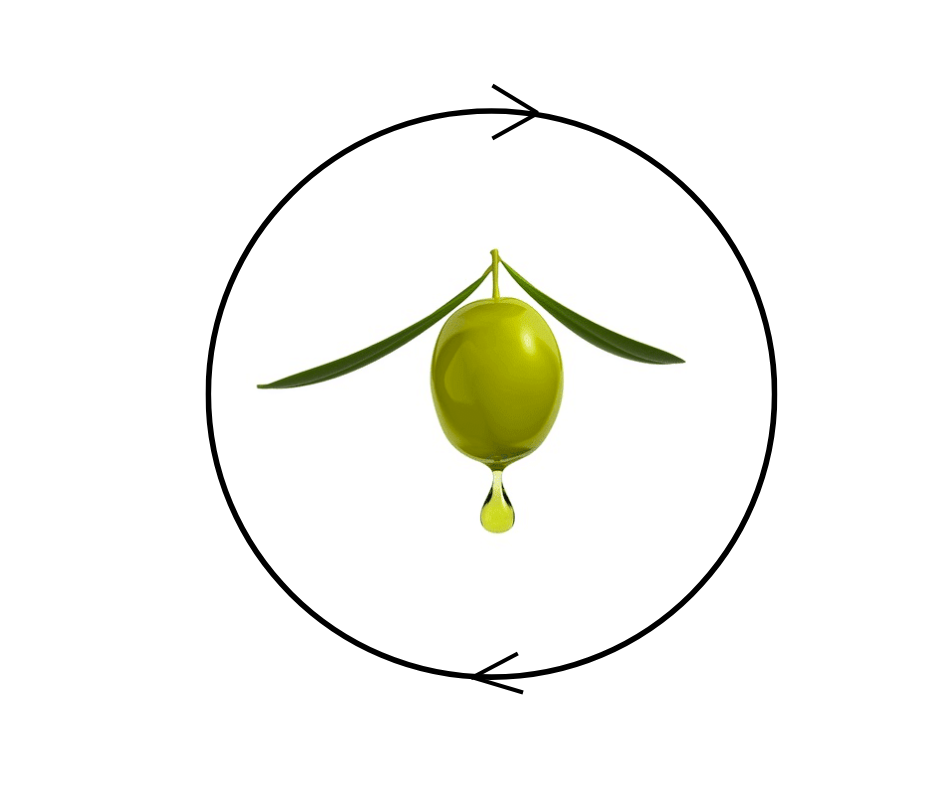
Flowering and growth (April to May)
Olive trees blossom with white flowers in April, setting the stage for fruit production. Light herbicides are applied around the tree’s base to manage weeds during this period, ensuring optimal nutrient absorption.
Spring and summer olive tree care
Trees receive foliar treatments with nutrients, fungicides, and insecticides between March and October to protect them from pests and diseases. These treatments are essential for maintaining the health of the trees and preventing common olive tree problems like fungal infections or pest infestations. A second treatment is applied in early autumn to support tree health.
When do olive trees fruit?
Olive trees typically begin fruiting 3–5 years after planting. Flowering occurs in spring, and the olives grow through summer, ripening by late autumn or early winter. Harvesting begins in November, depending on the olive’s optimal ripeness of each olive tree type and the desired oil quality.
- Drought Stress
Although olive trees are hardy and require less water than other crops, prolonged drought can hinder tree growth and reduce fruit yield. Solutions include:
- Drip irrigation: Supplies water efficiently to the roots.
- Dry farming technique: Using dust layers and tilling to minimise water evaporation. It also fills soil cracks caused by drought, preventing further water evaporation. However, this is only a temporary solution. In cases of severe water shortages, olive production can suffer.
- Pests
- Olive Fruit Fly: A significant pest that damages the fruit. Controlled through traps and selective insecticides.
- Black Scale: Reduces tree vigour. Managed by pruning and applying horticultural oils.
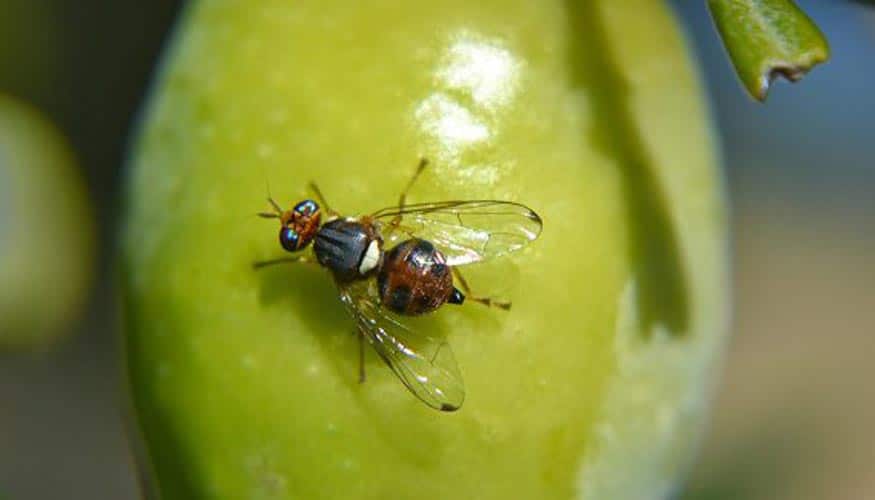
- Diseases
- Verticillium Wilt: A soil-borne fungus causing wilting and branch dieback. Prevented by planting resistant varieties and ensuring proper drainage.
- Peacock Spot: Fungal spots on leaves that weaken trees. Treated with copper-based fungicides.
- Nutrient Deficiencies
- Nitrogen Deficiency: Causes yellowing leaves; addressed with appropriate fertilisation.
- Iron Chlorosis: Leads to pale leaves, often remedied with chelated iron supplements.
Water: A key ingredient in olive tree care in Southern Spain
While olive trees are drought-tolerant, water is vital during critical growth periods:
- Spring (April to May): Water supports flowering and fruiting.
- Autumn (October to November): Sufficient moisture ensures fruit maturation.

The weather in southern Spain varies significantly throughout the year. Winters are generally mild, though occasional frost can occur from the nearby sea. Summers in Córdoba, Andalucía, Spain, are intense. Temperatures often soar to 40-45°C, with nightly lows still around 28°C from July to August. Rain is most common in winter, particularly from December to February. After that, a dry spell stretches through summer. Some farms can access water through rivers or underground streams, while others rely on rain alone.
At Reinos de Taifas, we employ both irrigated and dry-farming methods:
- Irrigation: Drip systems and wells supplement water during droughts.
- Dry Farming: Tilling techniques reduce water loss and maintain soil moisture.
The role of soil in olive cultivation
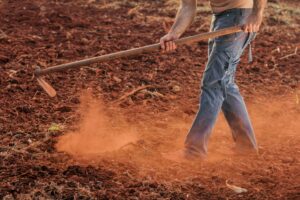
Healthy soil is the foundation of successful olive tree care. The calcium-rich clay on our olive farm provides essential minerals. In the past, soil tilling was frequently used to remove weeds. Today, modern weed management methods, like trimming, encourage grassroots growth, provide nutrients, and reduce soil erosion.
Minimal and strategic use of EU-approved fertilisers and herbicides further ensures soil health and sustainability. These include:
Insecticides: Cypermethrin, Deltamethrin
Fungicides: Copper calcium sulphate, Bordeaux mixture
Nutrients: Iron, Boron, Magnesium, NPK, and plant-based amino acids
Herbicides: Oxyfluorfen, Glyphosate
Harvesting process
We check each olive tree’s optimal ripeness from November to February before harvesting. Milling the olives immediately after collecting them ensures that the oil retains nutrients and a vibrant natural flavour. After extraction, our extra virgin monovarietal olive oil is stored in stainless steel containers to protect it from light and temperature fluctuations, preserving it until bottling for customers.
Ensuring quality after olive oil production
Every bottle of Reinos de Taifas EVOO undergoes rigorous testing to meet the EU’s highest standards:
- Taste Testing: Confirms authenticity as extra virgin olive oil.
- Packaging Tests: Ensures the oil’s quality is preserved.
- Contaminant Checks: Includes tests for over 100 possible residues and heavy metals. Testing for heavy metals is a legal requirement.
Our stainless steel storage and chemical-free processes further enhance quality and safety.
Sustainable farming practices for olive tree care
At Reinos de Taifas, sustainable farming is at the heart of our olive oil operation. Our eco-friendly practices include:
- Water Conservation: Efficient irrigation systems reduce water wastage, especially during dry periods in the summer.
- Integrated Pest Management: Minimal chemical use while protecting tree health.
- Recycling Waste: Byproducts from oil production are composted to enrich the soil.
Caring for olive trees requires a combination of traditional wisdom and modern techniques. Critical practices for Reinos de Taifas include:
- Pruning: Enhances air circulation and promotes healthy growth.
- Irrigation: Provides water during critical growth phases.
- Fertilisation: Supplies essential nutrients for fruit production.
- Pest and Disease Control: Prevents damage and ensures tree health.
Olive trees can thrive and produce fruit for generations with proper olive tree care.
Discovering the various types of olive trees
The variety of olive tree types contributes to the unique characteristics of our extra virgin olive oil. From the mild Arbequina to the robust Picual, each kind of tree offers distinct complexity, richness, and beauty of olive oil production, flavours that enhance daily kitchen meals.
Purchase Reinos de Taifas monovarietal extra virgin olive oil
Reinos de Taifas embodies tradition, innovation, and sustainability in producing extra virgin olive oil monovarietal. By addressing olive tree issues, understanding when olive trees bear fruit, and diligently implementing olive tree care and maintenance, we ensure that each bottle of our olive oil monovarietal reflects our commitment to excellence, allowing our customers to savour the finest quality.
Whether exploring the varieties of olive trees or seeking a premium extra virgin olive oil, Reinos de Taifas offers an authentic taste of Andalucía, Spain. Experience the family legacy of our “Green Gold.”
